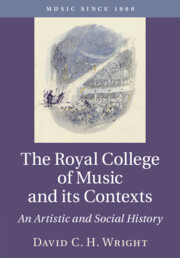Book contents
- The Royal College of Music and Its Contexts
- Music Since 1900
- The Royal College of Music and Its Contexts
- Copyright page
- Dedication
- Contents
- Figures
- Tables
- Acknowledgements
- Notes on the Text
- Abbreviations
- Introduction
- Part I Building and Consolidating (1883–1914)
- Part II Renewal and Conventionality (1919–1960)
- Part III Changing Musical Cultures (1960–1984)
- Part IV Into Its Second Century, 1984–2018
- Epilogue
- Works Cited
- Index
Part III - Changing Musical Cultures (1960–1984)
Published online by Cambridge University Press: 26 August 2019
- The Royal College of Music and Its Contexts
- Music Since 1900
- The Royal College of Music and Its Contexts
- Copyright page
- Dedication
- Contents
- Figures
- Tables
- Acknowledgements
- Notes on the Text
- Abbreviations
- Introduction
- Part I Building and Consolidating (1883–1914)
- Part II Renewal and Conventionality (1919–1960)
- Part III Changing Musical Cultures (1960–1984)
- Part IV Into Its Second Century, 1984–2018
- Epilogue
- Works Cited
- Index
Summary
Keith Falkner’s invigorating significance for the RCM in the 1960s was no less than Hugh Allen’s had been in the interwar period. Falkner came to the College after a formative time at Cornell University in the United States, whose distinguished music faculty had introduced him to American musicology and early and contemporary musical repertoires. Falkner’s very individual ‘can do’ mindset encouraged him to challenge the RCM Council to raise the money the College needed, while his wide range of personal and musical sympathies made him very approachable to the RCM students. Falkner appreciated the potential of the RCM’s historic collections, while also being aware of the significant benefit of such technological developments as an electronic music studio. Under Falkner, the RCM’s library service was rationalized, and students were encouraged to perform outside the College. Falkner linked the RCM into the Association of European Conservatoires. He increased the range of subjects students could study, to include the guitar and Baroque instruments and the number of brass and woodwind students increased. Falkner took a robust attitude to improving professors’ pay.
Keywords
- Type
- Chapter
- Information
- The Royal College of Music and its ContextsAn Artistic and Social History, pp. 233 - 306Publisher: Cambridge University PressPrint publication year: 2019

